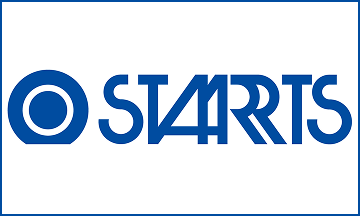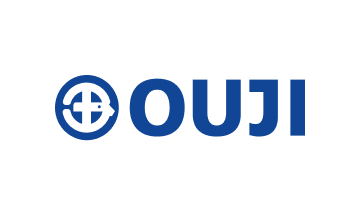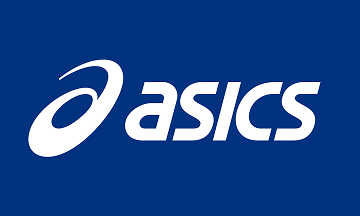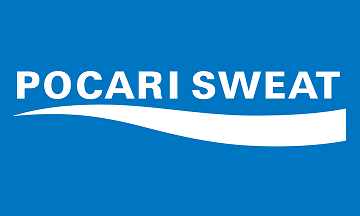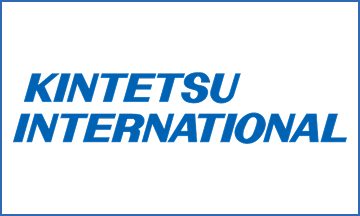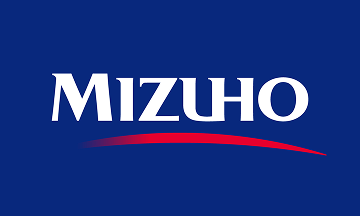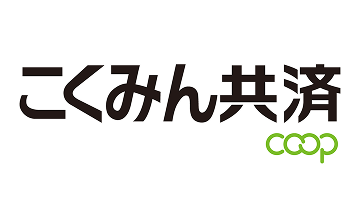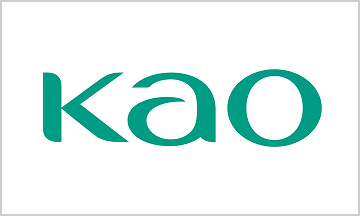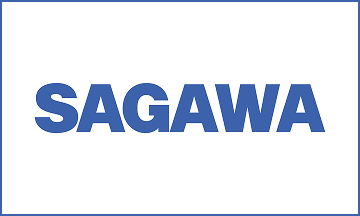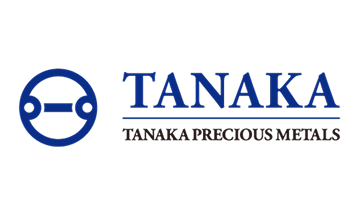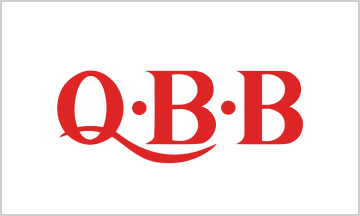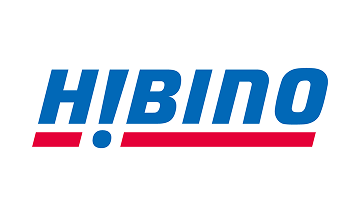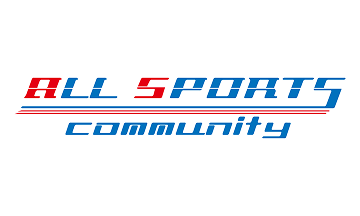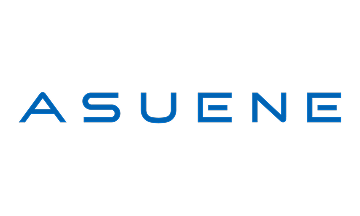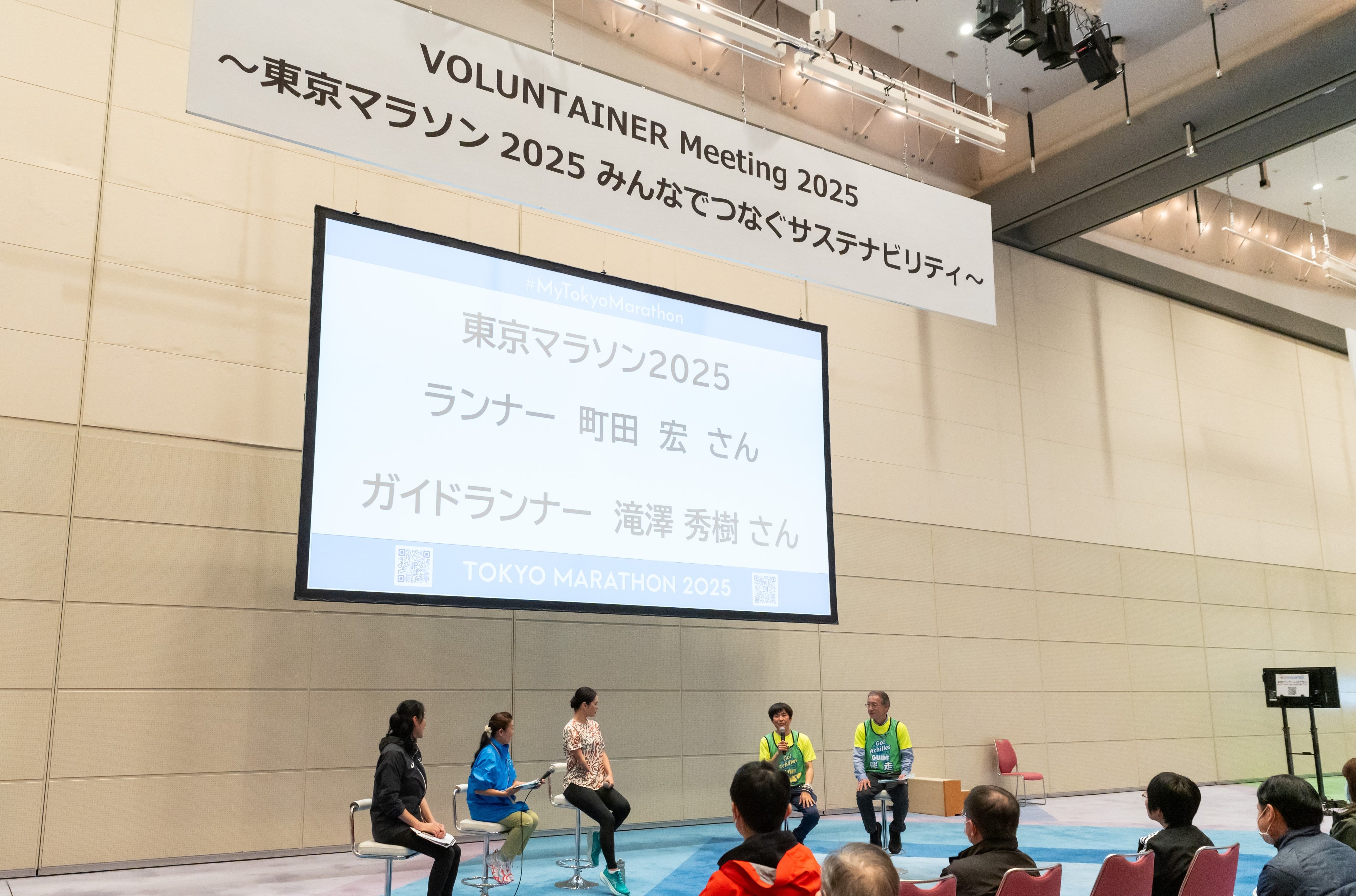
On February 28, 2025, during the Tokyo Marathon 2025, the "VOLUNTAINER Meeting 2025 ~ Explore, Learn, and Connect for Sustainability through Tokyo Marathon ~" included a talk session titled "Connecting Together! Another Interview Relay (Official Partner: ASICS Japan Corp.)." The event featured Mei Ichinose, a Paralympian who represented Japan in swimming at the 2016 Rio de Janeiro Paralympics and serves as an ASICS brand ambassador. She spoke with visually impaired runner Hiroshi Machida and guide runner Hideki Takizawa about the appeal of blind marathons and the trust between visually impaired runners and their guide runners.
■ After applying nine times, Mr. Machida finally got to run the Tokyo Marathon
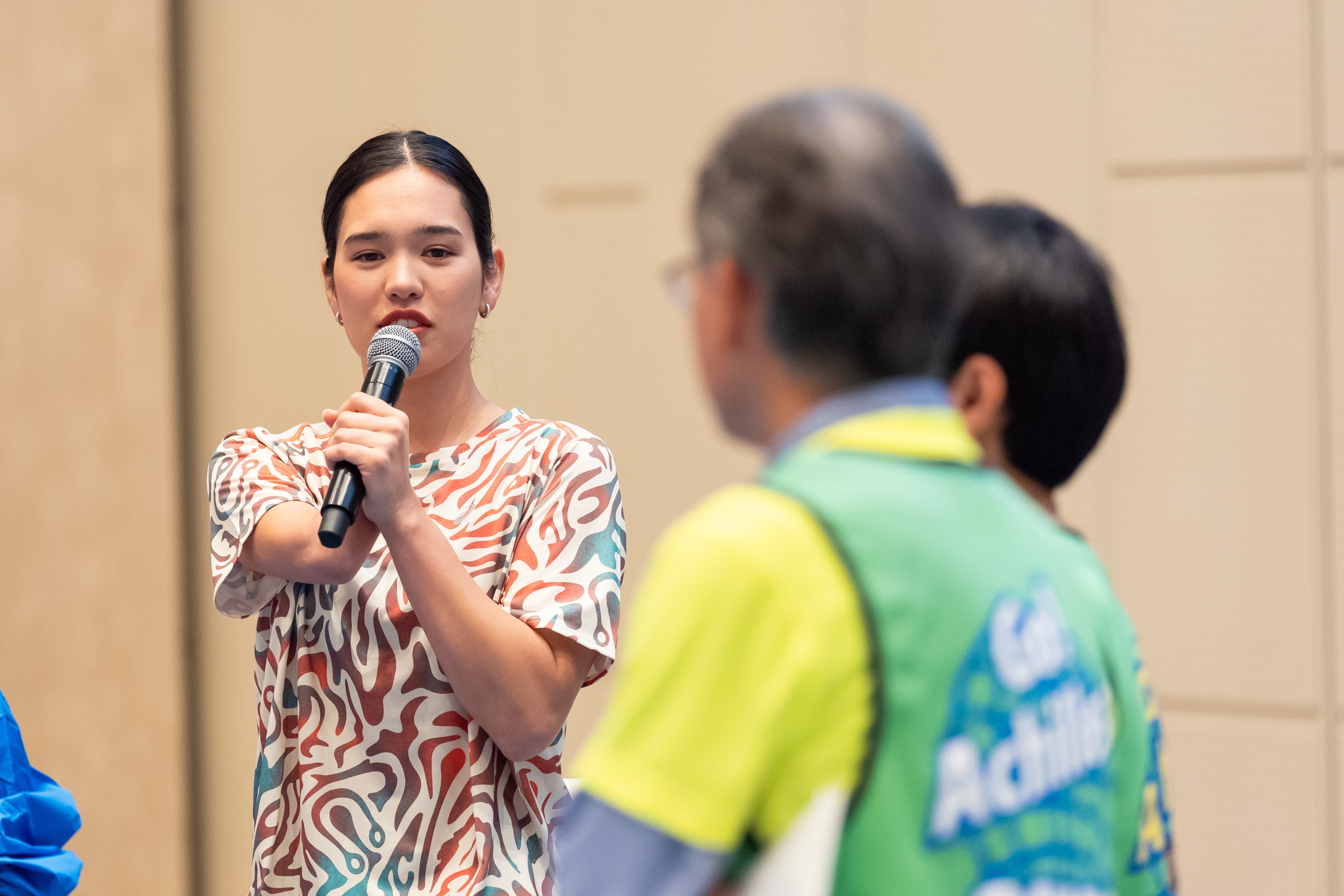
Moderator: Ms. Ichinose, thank you for joining us today. How's the atmosphere here at the venue?
Ichinose: I come from a swimming background and only started running marathons about two years ago. Coming to the Tokyo Marathon EXPO for the first time, I'm amazed by the huge crowd and the diversity of people from different countries and age groups--it really feels unique to marathons.
Moderator: There are lots of volunteers here, so you can feel the warmth, right?
Ichinose: Yes. Two years ago, I ran the Tokyo Legacy Half Marathon for the first time, and the festival-like atmosphere on race day was so warm, with volunteers cheering me on as I ran. That helped me push through, even when things got tough (laughs). Thank you!
Moderator: Now, let's welcome the first pair for our interview relay. Hiroshi Machida, who's running in tomorrow's Tokyo Marathon, and his guide runner, Hideki Takizawa. Thank you for joining us.
Ichinose: Is the name on your chest a nickname?
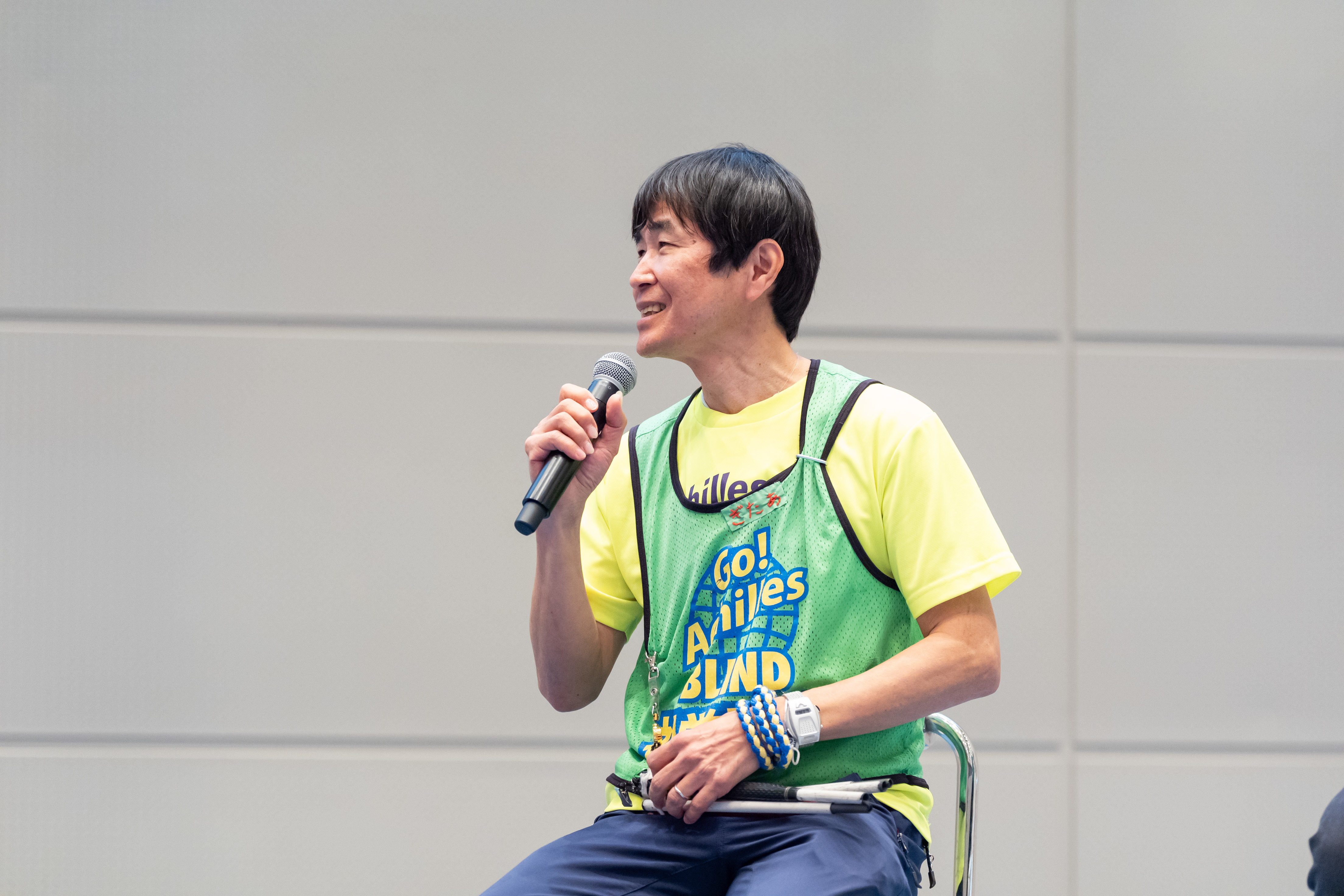
Machida: Yes. I play an instrument, so in our running club, they call me "Gitaa. (Guiter)" A lot of us don't even know each other's real names.
Moderator: I see. So, "Gitaa-san," aka Mr. Machida, and Mr. Takizawa, let's dive into some questions. Mr. Machida, have you run the Tokyo Marathon before?
Machida: This is my first time. I applied nine times and finally got selected. I became a ONE TOKYO Premium Member for the first time. This gives you a few lottery chances, and though I wasn't selected in the Premium Member draw, I won the general drawing.
Since I'm completely blind, I rely on audio output on my smartphone. When I opened the My Entry page, I heard "Rejected." I thought I'd failed again, but as I kept listening, it said "Rejected advance entry" and then "Successful general entry."
If I'd closed my phone after hearing "Rejected," I might have missed that I'd actually won.
I'm so glad I listened to the end!
Moderator: What's your experience with the Tokyo Marathon, Mr. Takizawa?
Takizawa: I've been rejected 10 times, one more than Mr. Machida (laughs). But this will be my second time as a guide runner. I'm also a ONE TOKYO Premium Member, which gives you three chances—"Premium Member," "Tokyo resident," and "General," but I also had an additional one. I feel like I have a fourth chance, as I might get called as a guide runner.
■ Becoming a Six Star Finisher at the Tokyo Marathon
Moderator: Could you tell us about what you're holding in your hand (the guide rope)?
Machida: I was diagnosed with an eye condition at 26. It gradually worsened, and by 40 I was using a cane. Now I'm completely blind—but I started running marathons at 50. I'm 65 now. For guided running, I hold this guide rope in my left hand, and Mr. Takizawa holds it in his right as we run. I'm part of Achilles International Japan, a guide-running club with headquarters in New York. Every year, we join a tour to the New York City Marathon, and in 2013, three years after starting marathons, I ran my first full marathon in New York. My three years of running were so moving that I've continued to take part in international races ever since—London, Boston, Chicago, and Berlin in 2019. I've applied for the Tokyo Marathon every year, and this year, I finally get to run. If I finish the race, I'll become an Abbott World Marathon Majors Six Star Finisher.
Moderator: Congratulations!
Machida: So, I'll be running with a Six Star Finisher bib on my back.
Takizawa: Runners like Mr. Machida, who are about to become Six Star Finishers, wear bibs that say "TODAY IS THE DAY!" in English. I think it will inspire cheers from the crowd, motivating us to do our best.
Moderator: How are you feeling about the Tokyo Marathon, and how's your preparation?
Machida: I've run 27 full marathons, with two DNFs, so I've completed 25. I recently ran the Ibusuki Nanohana Marathon in Kagoshima this January, and I was in great shape. My personal best is 4 hours and 43 minutes at the 2017 Boston Marathon, but these days, I've been running around 5 hours and 30 minutes—and I felt really good at Ibusuki in January. I've been able to keep my pace constant and run at an average pace, so I feel great right now.
But I do have one worry: last April, while training at night for the Aomori Sakura Marathon, I suddenly felt someone grab my calf...
Ichinose: What!?
Machida: It was a calf strain (laughs).
Ichinose: Oh, you scared me (laughs)!
Machida: That's why I couldn't run Aomori. So I'm being careful not to let it happen again, but otherwise, I'm in top shape and really looking forward to the Tokyo Marathon.
■ Things to be careful of when running as a duo
Moderator: How about you, Mr. Takizawa?
Takizawa: This time, I feel a huge sense of responsibility—if I burn out mid-race, Mr. Machida won't be able to achieve his big milestone. So I've been avoiding alcohol this week to stay in top condition.
Moderator: But earlier, Mr. Machida said you're "really fast."
Takizawa: Marathons depend a lot on how you feel that day. I can run a bit faster than Mr. Machida, but I want to be cautious.
Machida: Fast runners say guiding me is more tiring than running alone. People who can run sub-4 marathons get pretty exhausted running at my 5-hour-30-minute pace.
Takizawa: That's why we've been asking the Tokyo Marathon Foundation to allow two guide runners, and our guide-running team for athletes with disabilities has been making this request in various ways.
Ichinose: In Paralympic marathons, guide runners are sometimes rotated during the race, right?
Takizawa: Exactly.
Moderator: This time, two guide runners are allowed if declared in advance.
Takizawa: Thank you so much!
Ichinose: That is great.
Moderator: Ms. Ichinose, do you have any questions for them?
Ichinose: I watched the blind marathon at the Paris Paralympics in person, and one runner was disqualified because their guide runner went ahead at the finish. What do you have to be careful about when running as a duo? And are there any extra rules for running together?
Machida: The guide runner's job is to assist me, the runner, to run independently, so they can't pull me along. While they might move ahead during the race, they have to stay behind me at the finish. Guiding is really tough, and in marathons, faster runners often start walking in the second half. In a race as big as the Tokyo Marathon, there are a lot of runners walking in front of us, and since I keep a steady pace, we end up passing them—constantly weaving left and right, sometimes grabbing water—which puts a lot of strain on the guide runner. This is why I'm always grateful.
Ichinose: Your story really shows just how important communication and trust are.
Machida:Yeah, it does. By the way, our Achilles running club practices in Yoyogi Park. On the second, fourth, and fifth Sundays of the month, volunteers join as guide runners. Recently, high school students from an American school have started volunteering. This lets me share about visual impairments. It is fostering mutual understanding. Also, there are unsung heroes who help with aid stations during practice. In winter, they don't run, so they get cold—but they still do their best. Thanks to them, I can enjoy running.
Ichinose: That's teamwork!
Takizawa: On race day, tons of volunteers help out at aid stations. Their cheers and energy boost—especially in the second half—mean so much to us, so we run with gratitude.
■ Opportunity for international exchange between people with disabilities and their guide runners
Moderator: You mentioned volunteers—what kinds of cheers or encouraging words have made you feel happy or stronger?
Machida: In New York, Achilles is well known, so people often shout, "Go, Achilles!" Since my name is Hiroshi, I run with a "HIRO" sticker, and hearing crowds call "HIRO!" makes me so happy. Responding to cheers can be tough when I'm struggling, but it can also shift my mindset and make things easier. This time, I'll cheer back and really enjoy the run.
Takizawa: Any kind of encouragement feels great. In particular, when guiding a runner, I get encouragement not only from people along the course, but also from other runners. It ranges from simple words like "Do your best!" to unexpected comments like "You look great!"—though I don't necessarily agree with that myself. I find those kinds of unexpected encouragement very nice. So please share whatever comes to mind as it makes me really happy!
Moderator: We'd really appreciate loud cheers. Do you two do anything special to stay in sync?
Machida: We've known each other so long, we don't really need anything special.
Moderator: Is it like you're in perfect harmony?
Machida: Yes.
Takizawa: It is something like that. When guiding, matching height, stride, and pace is key. Luckily, Mr. Machida and I are about the same height, so our strides naturally sync up, which makes it easier to guide him.
Machida: Actually, when I was selected for the Tokyo Marathon and was choosing a guide runner, I asked Mr. Takizawa, but he was already booked for the 10.7km race. After some thought, I realized Mr. Takizawa was the only one for me, and I asked the runner who had already arranged to run with him if they would let me run with him in their place.
Ichinose: Sounds like Mr. Takizawa's in high demand (laughs)!
Takizawa: Even old guys like me get that sometimes (laughs). Some might think guiding is tough, but there's also walking guidance—maybe better called "accompanied walking"—so I hope more people will join as guide companions. By the way, Achilles is an international organization, and we're part of its Japan branch. It's based in Tokyo and has a sister relationship with the Nagai Waawaas running club in Osaka. This time, about 40 Achilles members from 18 countries will gather for the Tokyo Marathon, creating a great opportunity for international exchange between runners with disabilities and their guides.
Moderator: It's great to see these international exchange opportunities grow, right?
Machida:Yes. This time, I'll likely be the first visually impaired Japanese runner to become a Six Star Finisher, and there's a 24-year-old autistic man from the U.S. who is probably the youngest to achieve it. His father guides him, with his mother following behind, so she'll also become a Six Star Finisher. What an amazing family achievement!
Moderator: That's truly incredible. Let's give them a round of applause and wish them a great race! Mr. Machida, Mr. Takizawa, thank you so much. Any final words?
Machida: These days, I run slowly without trying to beat the clock and keep my heart rate low, so the training doesn't feel hard at all. Since I started at 50, I'd say to anyone who hasn't tried running a marathon: give it a go, it's not tough! I also hope my running encourages people to take an interest in marathons for runners with disabilities, so please cheer me on!
Takizawa: Thank you so much for this opportunity. I hope it sparks interest in guiding, and I'd love to see more people get involved and help in any way they can.
Moderator: Ms. Ichinose, any final thoughts?
Ichinose: Just one word: cool! I was huffing and puffing even in a half marathon. Hearing you say that marathons aren't tough, that you keep your pulse low, and that you started at 50 is really convincing (laughs)—it actually makes me want to push myself more in running. Thank you!
[After the race]
Hiroshi Machida successfully completed the Tokyo Marathon 2025, becoming a Six Star Finisher. He shared his thoughts as follows:
Thanks to the support of so many people, I became a Six Star Finisher.
The weather was great on race day, and the crowd's cheers helped me enjoy the run.
I faced repeated rejections for the Tokyo Marathon, but in the end, I'm glad it was the last one on my journey to becoming a Six Star Finisher.
I'll keep running as long as I can and spread the joy of sports.
● Related pages
Another Interview Relay: ASICS Brand Ambassador Mei Ichinose's Sustainability Initiative Experiences during the Tokyo Marathon
Comprehensive Report: VOLUNTAINER Meeting 2025


